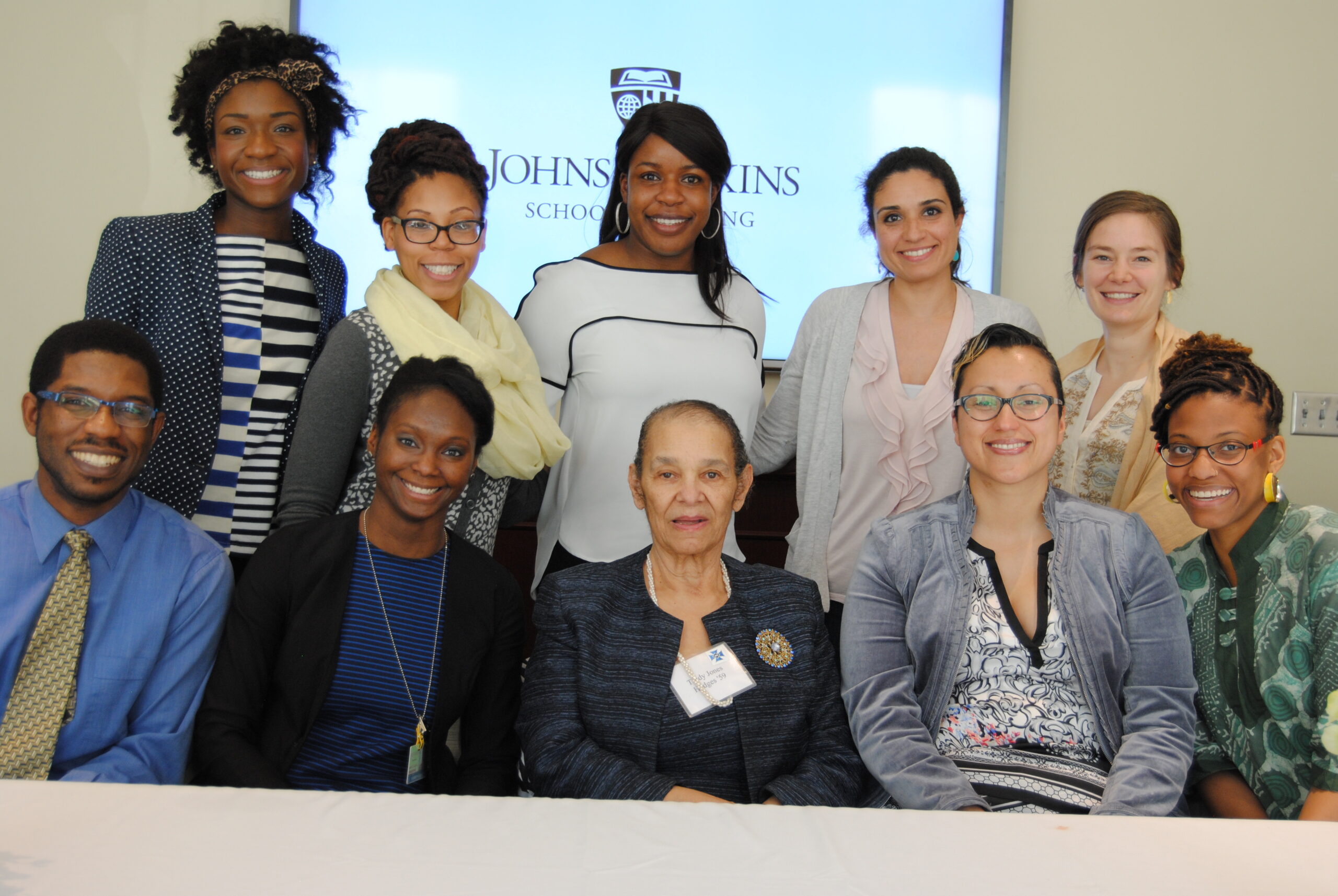Imagine being handed the opportunity to revive a student organization with a clean slate. You can control the direction, the organizational structure, and make it what you want. That’s what Chijioke Okeke-Ekpe, Emerald Rivers, Tamryn Gray, Meera Mohan, and the Johns Hopkins School of Nursing (JHSON) Black Student Nurses Association (BSNA) were given in August 2016.
With the revival, Chijioke hopes to create a long-standing and meaningful group that can be easily transferred down through cohorts. But the BSNA has big dreams for the group and wants achieve much more than a consistent membership.
The BSNA Leadership Team hopes to expand the 40 person membership, host more events, and cultivate a supportive environment where members across all nursing programs can help each other achieve. One of the many ways the BSNA has been able to cultivate a supportive environment is by hosting a weekly study session for members. At the start of each study session, the BSNA Leadership Team presents updates and news and opens the floor to address any matters or issues related to the group. After the brief, members then study with each other or provide help with assignments or classes. During this time, you’ll find PhD students giving graduating MSN students the scoop on program expectations or a fifth semester student giving guidance to a first semester student on the particulars of a class. These study sessions provide what Chijioke likes to call “a second orientation” to help relieve stress and help each other learn.
To strengthen group cohesion, the BSNA hosts “hang-outs” where members will gather at a member’s house and have a movie night where it’s “everyone’s choice.” Sometimes, the BSNA will even plan a school-wide event, such as a talent show where anyone from the School of Nursing community can sing, dance, read poetry, or even hula-hoop. “The key is to not have a set agenda for these events and ‘hang-outs’ and keep it pretty open,” Chijioke notes. The goal is to alleviate as much stress as possible while keeping the mission of the group at heart. The meet-ups are not mandatory, only encouraged, so that members don’t have to worry about one more thing on their schedules. The social gatherings make the BSNA a living, breathing, interactive cultural group instead of a strict student organization with overwhelming participatory rules.

Speaking of cultural groups, one of the leading success factors of the BSNA is its “Open Doors, Open Minds” policy. While the mission of the organization is to advocate for minorities and people of color, anyone in the JHSON community is welcome to join the group. “We want people of color and minorities to succeed in health care, but we also realize that we are not the only people at Johns Hopkins University,” explains Emerald Rivers, a leadership member for the BSNA. “A lot of people don’t think they can join because it’s the Black Student Nurses Association. We usually have to explain that we accept everyone in the SON community.” One of Chijioke’s goals is to bring the “cultural competence” lessons taught in lectures to life through the BSNA.
Another contributing factor to the success of this revival of the BSNA is the support from JHSON leadership and faculty. “The fact that faculty and the Office of Student Affairs have become so heavily invested in our group makes a statement that ‘we are here to stay’ and their support helps bring attention to our group,” says Tamryn Gray, a PhD student and leadership member.
Currently, the BSNA is weighing its decision on whether to be chartered through the National Black Nurses Association or stay as only a JHSON cultural group. “We’re still figuring out what works and how we want this organization set up. Once we have our goals and organizational structure solidified, then we’ll consider national affiliation,” explains Chijioke. Though joining the national organization opens doors to many resources, it also has requirements to maintain membership which could pull away from the relaxed and stress-relieving approach that is currently forming foundations for the group.
The BSNA leadership structure is still being developed and new roles are formed as needs diversify. “We started finding that people had a lot of international questions so our member Rut [Mulero], who has extensive international knowledge, assumed that role. Our member Emilie Casselle, who was formerly a professional recruitment consultant before coming to JHSON, serves as our Professional Development Leader and answers questions about what recruiters and health care systems are looking for in nurses,” says Chijioke. Each role is based on the experiences of the student and the needs of the group.
While its new foundations and organizational structure are still being built, the diversity, supportive environment, and open-door policy provide enticing incentives for joining the group, which is expanding at an explosive rate. Not only is the BSNA setting the standards high for cultural groups at JHSON, but they are leaving a lasting impression on its members and the School of Nursing community.
About the Author: CRAIG LEE

With the world becoming more connected through tweets, posts, shares, and pins, Craig keeps the School of Nursing in the mix with the ever-growing, complex web of social media. Craig manages all JHSON social media accounts, serves as an editor of SONvitals, and contributes to On The Pulse.
